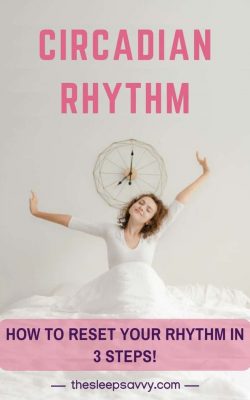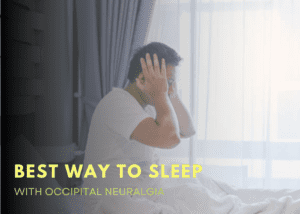We hope you love the product we recommend! Just so you know, at no extra cost to you, we may get a small commission for purchases made through links in this post. Your support is appreciated. Enjoy the read!
Ever wondered how our body just knows when to sleep or eat?
Well, it’s not magic.
There are many biological cycles that our bodies naturally function on – the circadian rhythm is one of them.
Like many of our scientific words, this word comes from Latin – “circa” meaning “around,” and “diem” meaning “day.”
It literally just means “around the day.”
These rhythms are physical, mental and behavioral changes that happen in a 24-hour cycle and are affected by light.
Keep reading to find out about circadian rhythm disorders, how to reset your rhythm and tips on maintaining a healthy routine!
Biological or Body Clock
Most of your circadian rhythms are controlled by what’s called a biological clock or body clock.
This internal clock is located in the part of your brain called the hypothalamus (pronounced hahy-puh-THAL-uh-muhs).
The hypothalamus is in charge of:
- Regulating body temperature
- Eating times and weight control (metabolism)
- Cortisol levels (manages stress)
- Melatonin levels (manages sleep-wake cycle)
- Emotions
- Sex drive
- Sleep and wakefulness
- Blood pressure and heart rate
Your clock reacts to signals outside your body (like light and darkness) to keep you synchronized to the world around you.
Even if you don’t know what time it is, your body does and will keep you on your cycles throughout the day.
Master Clock
This system coordinates all of your biological clocks, keeping them in sync.
The master clock is made up of about 20,000 nerve cells that form the suprachiasmatic nucleus (SCN).
The SCN is also located in the hypothalamus.
It sits in the optic chiasm (behind the eyes) where the nerve endings cross (like an X) from the eyes to the brain.
Because the SCN is connected to your eyes, light triggers it.
As in when your eye senses light, it sends a signal to the SCN.
This signal resets your clock every day to make sure your body doesn’t drift out of line with the world around you.
Without daylight, you’d be completely out of sync, which would throw off your circadian rhythms.
Different Circadian Rhythms
Circadian rhythms aren’t only found in humans.
Most living things including plants, animals, fungi and some tiny microbes have them too.
There are 3 common circadian rhythms:
- Sleep-Wake Cycle
- Body Temperature Cycle
- Hormone Cycle
1. Sleep-Wake Cycle
Many people think the circadian rhythm is the same thing as the sleep-wake cycle.
The sleep-wake cycle does have something to do with it but it’s just one of the many rhythms that make up the circadian rhythms.
This cycle happens daily and determines when it’s time to be awake and when it’s time to sleep.
On average, you need 7-9 hours of sleep (usually at night) which leaves about 15-17 hours of wakefulness.
The sleep-wake cycle is directly related to the amount of light you see throughout the day. Artificial or not.
If you’re sensitive to light, you can use an eye mask or blackout curtains while you sleep.
Everyone’s sleep-wake cycle is unique and is influenced by your body’s temperature and hormone release.
2. Body Temperature Cycle
It shouldn’t be a surprise that your body’s temperature fluctuates throughout the day (and night).
A new study shows that temperature actually controls our body’s cycles.
A change in temperature “set the timing of cells, and ultimately tissues and organs, to be active or inactive.”

Your body will reach its maximum temperature – a healthy 99.5°F (37.5° C) – in the late afternoon and will start to decline as it gets closer to bedtime.
Why is that?
Well, your body doesn’t need to be as warm because you don’t need to be that active.
Falling asleep is easiest when your core temperature is lower (during the evening) and hardest when your body is warm (during the day).
The normal, healthy temperature ranges from 97.7–99.5 °F (36.2° C- 37.5° C) during the day.
It will drop about 1 or 2 degrees in the evening to get you ready for a good night’s rest since we sleep better when we are cooler.
Your body also tends to lose heat while you sleep, helping you fall and stay asleep.
Your temperature will start to rise when it gets closer to morning, to prepare you for the day.
3. Hormone Cycle
Your body releases many hormones throughout the day.
The two most common hormones are cortisol and melatonin.
They both are affected by the amount of light your eyes take in and are related to sleep.
Cortisol
Cortisol is your body’s natural stress hormone and acts as your own personal alarm system.
It’s what keeps you alert throughout the day.
The highest level of cortisol is released in the morning to wake you up and get you started for the day.
While the lowest level is released at night to prepare you for bed.
Melatonin
Opposite of Cortisol, Melatonin is affected by light and is your body’s natural sleeping pill.
It’s produced in the pineal gland of the brain and controls your body clock. The pineal gland’s main function is to produce melatonin and maintain circadian rhythms.
Melatonin is released during the night to help you fall and stay asleep.
If you’re having trouble going to bed, try some melatonin supplements. They’re available at most grocery stores and you don’t need a doctor’s prescription.
The following doses have been studied and researched by experts, but remember to always ask your doctor about the right dosage for you.
- Trouble falling asleep? Try taking 0.3 – 5 mg of melatonin about 30 minutes before bed. You can do this daily for up to 9 months.
- Got a more severe condition or a sleeping disorder? Go up to 2-12 mg, but you should only do this for up to 4 weeks.
Sleep Rhythm
Your sleep routine isn’t just based on the day/night cycle, it’s actually a part of your genes.

You’ve heard of people referring to others as a “morning person” or “night owl,” right?
Well, the scientific names are known as chronotypes.
Each person’s melatonin and cortisol hormones are released at different times of the day.
Morning person, early bird, morning lark – these are all different names for the early chronotypes.
If you’re a morning person, you function best in the morning because your body produces more cortisol. Making you more alert and active.
This works the same way with melatonin.
For example, a morning persons’ melatonin levels may raise around 6pm, making you feel tired around 9pm or 10pm.
The “night owl” is a late chronotype.
If you are a late chronotype your levels of melatonin will rise late, around 10pm or 11pm.
This means you won’t get tired until about 2am or 3am…and you won’t want to wake up so early in the morning either.
Digestive Rhythm
Your digestive system has a distinct rhythm too.
Most of us eat around the same time every day, and when we do, our bodies release hormones to help digest and metabolize (process) food properly.
You can throw off your digestive tract if you eat at irregular times or right before bed.
Night time is when your metabolism is at its lowest.
Meaning your body won’t be able to produce the enzymes needed to break down your meal as fast, making it hard to fall asleep.

Bottom line:
Disrupting your eating routine will disrupt your sleep cycle.
And interrupting your sleep and circadian rhythms may increase your chance for digestive disorders like:
- Reflux
- Ulcers
- Inflammatory bowel issues
- Irritable bowel disease
- Gastrointestinal cancer
It’s best to keep a healthy sleep and eating schedule because they’re so closely connected.
Circadian Rhythm Disorders
Disruptions in circadian cycles can cause metabolic syndrome, cancer, and cardiovascular disease, so try to avoid the below as much as possible.
1. Jet Lag
We’ve all gotten on a plane, crossed time zones and experienced jet lag before, right?
Since the shift in time and light cues on the body and brain have changed, this forces you to change your sleep routine abruptly.
Putting you in conflict with your regular sleep patterns and leaving you drained and unable to think clearly.
It’s only a temporary condition but will still take a few days to sync your circadian rhythm to the local time.
Symptoms of jet lag vary depending on the health, age and the number of time zones you cross.
These symptoms may include:
- sleep disturbances – insomnia, lethargy and fatigue
- headache
- irritability, confusion, and difficulty focusing
- mild depression
- loss of appetite
- gastrointestinal disturbances – diarrhea or constipation
Jet lag doesn’t only affect your sleeping/waking patterns, but also your eating and working routines.
Jet Lag Risk Factors
There are some risk factors that may make your symptoms more severe or last longer.
- Travel Across 3+ Zones
The more time zones you cross, the more difficult it’ll be to adapt to a new sleeping pattern.
The general rule of thumb is it’ll take your body one or two time zones per day to adjust.
For example, if you cross 6 time zones, it‘ll take you 3-6~ days to adjust to a new circadian rhythm.

- Flying East
It’s harder on your body if you travel from west to east.
Why?
Because traveling east means you “lose” time, while you “gain” time traveling west.
Losing time means your body has less time to adjust, making it more difficult to sync to the new rhythm.
You’ll still have some light symptoms of jet lag, but at least you’ll have more time to adapt when traveling west.
- Elder Travelers
Your parents may recover slower because their circadian rhythms have slowed down with age.
They’ll experience more daytime fatigue and sleep disruption than younger adults.
Also, if they have any pre-existing conditions, like sleep deprivation, stress, or poor sleep habits, jet lag symptoms can get worse.
- Frequent Flyers
Got a friend who’s a pilot, flight attendant, or travels for work?
Do they complain about always being tired or not having enough energy?
Well, those that constantly travel will have a hard time adjusting.
The different light cues make it almost impossible to ever settle into a circadian rhythm before they have to adjust to another one.
Also, traveling on a plane can be stressful by itself.
The cramped seating, bad airline food, crying babies, smelly people sitting next to you, rough turbulence can all irritate and add to your jet lag.
- Alcohol Use
I’ve seen many nervous flyers taking advantage of the in-flight alcoholic drinks, thinking drinking is the best option to calm their body.
But it actually will make your anxiety worse.
Overconsumption of alcohol during long flights can disrupt your sleep schedule and cause dehydration as well as trigger nausea.
Never Have Jet Lag Again!
Do you frequently fly for work or fun?
There are some things you can do to beat jet lag and help your body adjust faster to the new circadian rhythm.
- Stay in Shape
Keep up your daily exercise, healthy diet and sleep schedule.
Your stamina and conditioning will help you adjust better once you land.
If you’re not already an exerciser, that’s okay. Start a couple of weeks before your travel.
Don’t forget to keep up the exercise during your travels!
- Avoid Alcohol & Caffeine
Both alcohol and caffeine reduce your body’s ability to fall and stay asleep.
Don’t drink any before, during or after your flight.
Alcohol may trigger nausea and cause dehydration, while caffeine could intensify the traveler’s anxiety.
You don’t want either!
- Drown Yourself in Water
Flying dehydrates your body because there’s less moisture in the air so up high.
Prepare for this by drinking lots of water before boarding the plane, during the flight AND after you land.
Yup, this means that you’ll be getting up to go use the restroom. A lot.
Which leads me to my next point.
- Pick an Aisle Seat
I know a lot of people who think window seats are the best.
I used to be one of them until I realized all the awesome things with an aisle seat.
You can get up whenever you want (but only if the seat belt sign isn’t on!) to stretch or go to the restroom.
Moving around will help get your blood flowing and reduce the chance of getting a blood clot in your legs.
Even the smallest movements and stretches can help relieve stiffness and refresh your body.
- Shift Your Schedule Beforehand
3-4 weeks before your trip, adjust your daily routine by setting it back or forward an hour each week.
Set it back if you are traveling east.
Set it forward if you are traveling west.
For example, for the first week, set your time back one hour and for the second week adjust another hour back.
This’ll help you ease into the new schedule and mentally prepare for the change.
Since your sleep-wake cycle is related to your digestive tract, if your sleep schedule is shifted back 3 hours, you’ll need to shift your meals 3 hours back too.
- Take Supplements
On a plane, your body won’t know when it should produce melatonin.
Melatonin is a highly effective supplement and experts recommend it to help prevent jet lag.
Once you land, if you have trouble sleeping naturally, try taking melatonin about 20-30 minutes before bedtime.
Pair it with a sleep mask and earplugs, so you can eliminate light or noise exposure.
Groggy with melatonin?
Take magnesium supplements instead.
Magnesium is a natural essential mineral that our body doesn’t produce, so we have to eat our dosage in food.
One of its natural effects is relaxing muscles, making it easier for you to fall asleep.
Jet lag is a temporary sleeping disorder, but there are many ways you can prepare for it.
2. Social Jet Lag
Despite the name, jet lag isn’t only caused by traveling.
I’m sure at one point in time, you’ve been guilty of staying out late on a Friday night and sleeping in on the weekend.

Unfortunately, this messes with your circadian rhythms.
Social jet lag is actually considered a chronic condition because you throw off your routine WEEKLY while in the same location.
If you work a typical 9-5 job, whether at the office or as a stay-at-home mom, your body is synced to that routine.
If you stay out late one night, your body won’t expect a sudden change and will have a harder time adjusting.
We also have our preferred time of sleep and wakefulness known as chronotypes.
Being a night owl or an early bird play a part in social jet lag.
Night owls tend to get less sleep during the week and try to make up for it on the weekends by sleeping in.
While the early bird experiences the opposite. They’re able to function better throughout the work week.
3. Shift Work (Especially Graveyard or Rotating)
You’ve heard of the graveyard shift before, right?
It’s when you work during the night and sleep during the day.
This kind of schedule is the worst for your health!
If you’re a shift worker (especially rotating shifts), you probably have trouble falling asleep.
The light from outside is making your body produce more cortisol and less melatonin, which are the hormones that make you alert and tired.
The cortisol will keep your body awake…even though you really need to sleep.

If you don’t sleep on the traditional sleep schedule, here are some tips to help with your sleep routine:
- Quit your job (or at least seriously consider switching to day shift)
- Turn on a bright light as soon as your alarm goes off
- Wear sunglasses home from work
- Sleep with blackout curtains
You are essentially tricking your body into thinking it’s night time when it’s really day time.
Remember, your sleep-wake cycle is directly affected by the light your eyes take in.
So if you’re not taking in any light (natural or artificial) during the real day, your body thinks it’s night time and will produce more melatonin to help you sleep.
But the BEST thing you can do for yourself is prevention.
So, try NOT to work any graveyard shifts at all.
4. Daylight Saving
Your sleep-wake cycle will get disrupted during daylight saving time whether you “lose” or “gain” an hour.
That one hour of change can dramatically affect your circadian rhythm.
Studies show that night owls have a harder time shifting to daylight saving in the spring and morning larks have a harder time shifting in the fall.
Why we think shifting an hour ahead is a good idea is beyond me!
We aren’t actually gaining anything and it just messes up our rhythm.
Don’t you agree?
How can I reset my circadian rhythm?
Adjusting your circadian rhythm is just like overcoming jet lag.
A) Reset in 3 Easy Steps
- Eat at a Consistent Time
- Eat breakfast, lunch, and dinner at the same time each day
- Don’t eat a big meal less than 3 hours before bedtime
- Fast if you can
- Going without food for 12-16 hours mimics sleep
- The first meal after the fast tricks your brain into thinking it’s morning
- Continue regular eating patterns after you break your fast
- Stick to a Consistent Sleep Schedule
- Wake up and go to bed at the same time every day – even on the weekends
- Expose yourself to light as soon as you wake up to boost your cortisol levels
- Limit your light exposure before bed – this means no screens or checking your social media right before bedtime
B) Keep a Healthy Sleep Routine
After you reset your circadian rhythm, keep it on track.
Practice healthy habits throughout the day and limit the bad ones.
Do:
- Maximize activity throughout the day – if you work a desk job, try to walk around or stretch every hour to get your blood flowing. Better yet, exercise regularly.
- Outdoor activities – increase your light exposure to keep cortisol levels up so you won’t get sleepy during the day
Don’t:
- Nap during the day – a big no-no. If you get sleepy, it’s a good sign you need to move around more
- Eat heavy or spicy food before bed – messing with your digestive system will disrupt your sleep.
- Drink alcohol or caffeine before bed – either will keep your body “buzzing” throughout the night and you won’t get a good night’s rest.
- Work, exercise or checking social media before bed – limit blue light exposure
Doing activities that expose you to light, make your brain work or promote blood flow will make your body more awake.

Remember, everyone’s circadian rhythms are different depending on if they’re a night owl or a morning lark.
You should try your best to adjust your daily routine to what works best for your body.
But here are the two most important things to remember about resetting your rhythm:
- Try to expose yourself to light earlier in the day, and
- Eat at the same times throughout the day.
Now that you know how your circadian rhythm works, it’s time to get them back on track and in sync!
Goodbye daytime sleepiness, hello restful nights!
Circadian Rhythm FAQ
What is the circadian rhythm and why is it important?

Every living thing on earth has one!
Also known as the sleep/wake cycle, it’s internally generated and can be affected by external factors like temperature and light.
So you might want to pick up a pair of earplugs and a sleeping mask.
It’s important because it determines the feeding and sleeping pattern of all animals, including humans.
The circadian rhythm is also linked to biological processes such as hormone production, brain wave activity and cell regeneration.
How long is the human circadian rhythm?
The adult human circadian rhythm lasts around 24 hours, which reflects the light/dark cycle created by the Earth’s rotation.
Although each person’s rhythm is unique, generally we feel sleepiest between 2am – 4am and 1pm to 3pm.
This may vary depending on whether you’re a night owl or morning bird.
We may feel less sleepy during these times if we had enough sleep the night before.
How can I improve my circadian rhythm?
To improve your circadian rhythm, try out these tips:
- Exercise daily – Doing so can help you sleep better at night.
- Reduce stress – You can do this through meditation, changing the way you react to certain events and among other ways.
- Expose yourself to sunlight early in the morning – It’ll make you feel more refreshed, awake and you’ll get more Vitamin D!
- Eat a protein-rich breakfast – This provides you with energy to get you through the day.
- Set a regular bedtime and stick to it – It’ll help reset your biological clock.
- Avoid screen time an hour before bedtime – Turn off your mobile devices and don’t sleep with the TV on.
- Cool & Dark Environment – Turn off as much light as possible and decrease your room’s temperature.
- Make your bed comfort – Remove unnecessary pillows, blankets and other things that can affect your comfort.
What gland regulates circadian rhythms?
The pineal gland is located near the brain’s center, and is known as the “third eye” due to its sensitivity to light.
While its complete function is not 100% understood, scientists do know that this gland secretes melatonin – the hormone that regulates your sleep/wake cycle.
The amount of melatonin secreted varies, but it peaks at night and promotes sleep by making you feel drowsy.
How does stress affect circadian rhythms?
Stress affects circadian rhythm by triggering high levels of the cortisol hormone throughout the day and into the night, making it difficult to sleep.
Since cortisol affects circadian genes in the adrenal and liver cells, it can cause sleep/wake disruption since this hormone isn’t released at the right times during the day.
This is how we get cortisol (the stress hormone):
The hypothalamus secretes the CRH hormone, which encourages the pituitary gland to release ACTH hormones, which tells the adrenal gland to produce more cortisol.
How do circadian rhythms influence human behavior? What happens if your circadian rhythm is out of whack?
Circadian rhythms influence human behavior by indicating when you sleep, wake up, eat and do everything else in life.
It even regulates down to the physiological functions like your heart rate, body temperature, blood pressure, and the release of hormones.
When your circadian rhythm is out of whack (usually from traveling and irregular sleeping schedules), you may feel fatigued and unable to sleep.
If the problem persists, it can eventually lead to serious health problems (obesity, cardiovascular diseases, and even cancer), as well as neurological issues (bipolar disorder and depression).
Studies have also linked circadian rhythm dysregulation with aggressive behavior, which is partially controlled by the brain.
How long does it take to reset your circadian rhythm?
To reset your circadian rhythm, it can take a minimal of 3 days to a week. You’ll have to:
- Establish a new sleep/wake schedule.
- Manipulate your exposure to natural light since the cycles of light and darkness are what controls your biological clock.
- Sleep earlier than normal. Start by going to bed 15 minutes earlier the first few nights, then increase to 30 minutes, then 45, 60…etc. until you reach your goal.
Do naps mess up circadian rhythm?
Naps do not mess up circadian rhythms. Short naps that is – longer naps may.
Most people’s circadian rhythm dips between 1-3pm, so you can try to snooze then, but make sure that:
- you sleep no longer than 20 minutes
- it’s during 1-3pm
- you avoid caffeine after lunch
Yes, there’s a lot of science behind the human body and brain!
Which is why you should try to learn as much as you can about your own Circadian Rhythm!
>> First, get a good mattress. Check out the best futon mattress!<<








